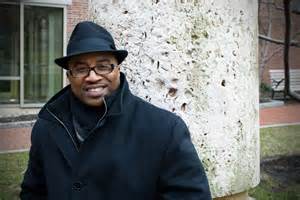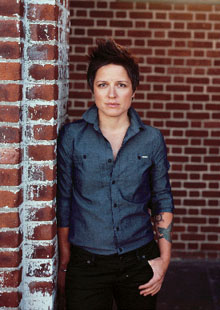From Jazz Manhood to Jazz Personhood
/There has been a lot of talk online recently about jazz,
gender, and sexuality. Musicologist Guthrie Ramsey, for example, gave us a
historian’s take on what he calls “jazz manhood” in bebop and the career of
pianist Bud Powell, and how this contributed to his own embarrassment as a boy playing
the piano, which he loved, rather than the more masculine saxophone. Drummer
Allison Miller wrote a moving essay on the challenges of being not only a
woman, but also a lesbian, in the jazz world. Crooner Spencer Day discussed coming
out, homophobia, the absence of gay voices in jazz, and how all of this has influenced
his career, both creatively and commercially. And singer Michelle Shocked, long
believed to be a lesbian herself, lashed out with an unfortunate, if
predictable, homophobic rant during her recent appearance at Yoshi’s Jazz Club
in San Francisco.
Gender and sexuality are not new issues for jazz, but they haven’t been discussed that much outside of academic circles. So, as someone who spends a lot of time thinking about gender and jazz, I found these essays, the first three at least, refreshing and exciting.
Dr. Guthrie Ramsey, Jr.
While each essay tells a unique story of coming to terms with gendered and sexual identities in jazz and the world at large, they all reiterate one core point: jazz has been, and very much continues to be, a boys club; more specifically, a heterosexual boys club. (I’ve written about that here.) It’s defined by a certain maschismo and bravado, virtuosity and genius, and it’s often paired with an objectification of women and denigration of anything feminine.
Historically, in the world of jazz, to be a musician is, by definition, to be a man. This was certainly true seventy years ago, in the 1940s, when Sarah Vaughan began her career as a big band singer. It was crucial that she become one of the boys, and she was a master at it. In addition to possessing exceptional talent, she swore (earning herself the nickname “Sailor”), joked, drank, gambled, participated in band pranks, and bunked with the men when no other accommodations were available. This gained her the respect and praise of her colleagues. “Sarah Vaughan acted just like one of the boys,” Dizzy Gillespie reminisced. “She put herself in that position, one of the boys, just another musician.” And Billy Eckstine made a similar point: “Sarah just came up right as a bunch of the guys: just as a musician.” This was high praise. But not easily earned. Eckstine’s comment, for example, followed an anecdote where he described the boys in the band beating Vaughan whenever she stepped out of line. And Vaughan, herself, confirmed that Eckstine’s unit was a very rough band. “They kept me in order,” she said. “They would beat me if I didn’t listen to them!” But this was the price Vaughan had to pay for “equality.” To be considered one of the guys, a “real” musician, she had to accept whatever they dolled out.
The same was true more than sixty years later when Allison Miller began her journey in jazz, and it’s remarkable how closely her experiences resemble those of Vaughan:
Drummer Allison Miller
“I learned how to curse like a sailor, volley and one-up sarcastic insults with speed and precision (with beer in one hand and a whiskey in the other) and demean women with vulgar prowess. I also learned how to "man up" and show no emotion. This was all fine and dandy with me. I loved it. I was a little tomboy drummer, obsessed with jazz, who hadn't quite discovered her sexuality. I would just hang out at [my teacher] Walt's house, practicing the drums, cursing, drinking, talking shit and listening to old jazz records. My sexist vulgarity quickly surpassed most of the boys'.”
But then Miller encountered a problem. Her emerging identity as a lesbian and feminist was at odds, often blatantly so, with her identity as a jazz drummer. “How was I supposed to be one of the boys when I was realizing how powerful I felt as a woman?” Miller didn’t want to be what she termed a “lesbian feminist buzzkill,” but she felt invisible, overlooked, and less of a person when she didn’t stand up for her beliefs. “I didn't know how to be all of myself,” she said.
So Miller began speaking up when she heard sexist comments, and much to her surprise, most of her colleagues were receptive, open to a dialogue, and willing to change. And in the process, Miller became an integrated, whole person, comfortable with expressing herself.
Spencer Day shared similar sentiments, explaining that he needed to come out in order to live a fully realized, honest life, not to mention produce his best art – even if it meant being less commercially viable. When asked if he had advice for young artists struggling with the decision to come out, he said:
Crooner Spencer Day
“The world is becoming kinder to us. We're making progress and we do that by being visible. This is how the change happens, by standing up and breaking people's perceptions of what a gay man sounds and looks like. More activism just happens by creating good art and living your life in an open way, unapologetically.”
This is the good news. Maybe the world of jazz is beginning to change, albeit slowly. Even though there are still very clear cultural expectations of what constitutes a jazz musician – man not woman, straight not gay, black but increasingly white – new voices continue to enter the mix. And these new voices – be they the likes of Sarah Vaughan, Billy Strayhorn, Allison Miller, Spenser Day, and countless others – push the envelope. They force fellow musicians, critics, and listeners to rethink, redefine, and reimagine what a jazz musician should look and sound like. This is a good thing. When all jazz musicians have the freedom to be themselves – to speak, sing, and play their personal truths – not only will there be fewer rants from the likes of Michelle Shocked, but jazz as an art will thrive, too. Infused with new experiences and world views, it will become stronger, bolder, and even more powerful. In short, it will become more universal.




